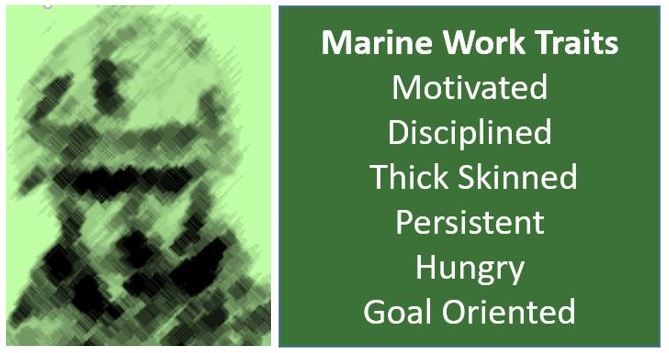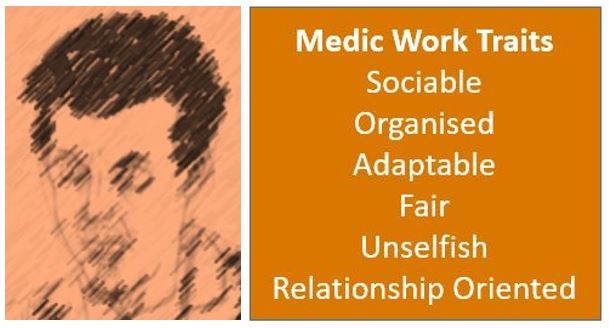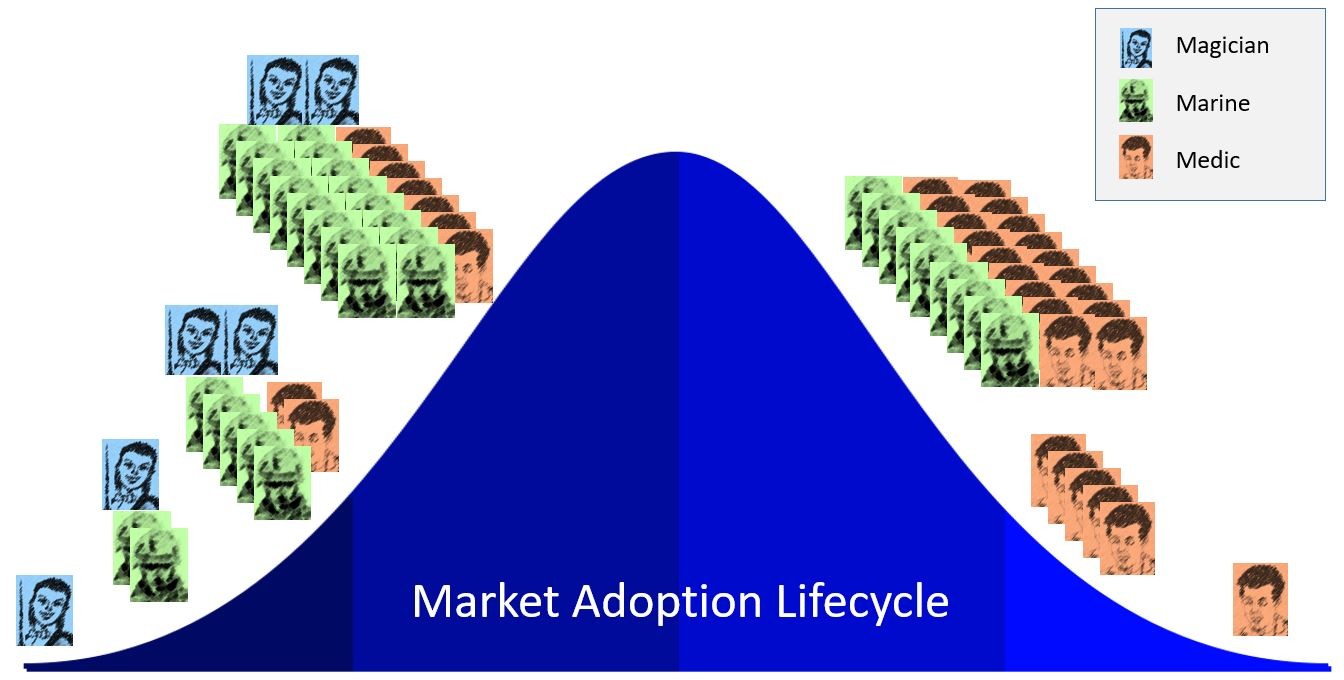Blog
Subscribe
Join over 5,000 people who receive the Anecdotally newsletter—and receive our free ebook Character Trumps Credentials.
Categories
- Anecdotes
- Business storytelling
- Collaboration
- Communication
- Corporate Storytelling
- Culture
- Decision-making
- Employee Engagement
- Events
- Fun
- Insight
- Leadership Posts
- News
- Podcast
- Selling
- Strategy
Archives
- October 2024
- September 2024
- August 2024
- July 2024
- June 2024
- May 2024
- April 2024
- March 2024
- December 2023
- November 2023
Years
Magicians, marines, and medics: Understanding sales roles
A long time ago, when working on oil rigs, I remember being told there are two types of welder: the type that can weld all day on a pipeline and the type that can perform intricate repairs.
“Don’t ever mix ‘em up!” I was admonished.
For what seems like forever, we’ve been told that there are two types of salespeople: hunters and farmers. The problem with this classification is that there are two types of hunter and you had better not mix them up!
So, allow us to introduce three sales personas that will help you think more effectively about managing and developing sales teams. The hunters are magicians and marines, while the farmers are medics.
Magicians
Magicians are new business developers who can open up a new geography, crack the first market with a new product, or bring in unexpected mega deals.
Also called rainmakers, magicians work without a fixed sales process because they have to create one for each new sales problem.
Every salesperson likes to think they are a magician, but true sales magicians are exceedingly rare.
A key characteristic of the magician’s situation is they have no relevant success story. Consequently, magicians must master less common story types, like insight and clarity stories.
Magicians may carry a business card titled ‘Business Development’, but it could also say Founder, General Manager, Business Manager, Principal Consultant, Product Specialist, or Market Strategist.
Magicians are curious and creative in the process of moulding and sculpting their own organisation and a future client organisation into two shapes that match to make a deal.
The magician’s work may look like good fortune, but if you make the mistake of thinking that and allowing others to take credit for their success, be ready to find another magician.
After magicians weave their magic, sales and business managers can create a sales process and send in marines to systematically expand from the beachhead.
Marines
Marines work a territory and follow a well-understood sales process.
The stock story for marines is the success story, that is, stories of clients similar to their prospect that succeeded with their offering.
Through training or by character, marines are well suited to a type of dirty work that most do not enjoy. Their work includes contacting people they don’t know, being rejected often, and handling the pressure of meeting financial targets each month.
Great marines are also rare but not as rare as magicians.
Marines are disciplined and focused. They appreciate that the harder they work, the more business they write, so they play the numbers game. Magicians do not work like marines. Indeed, casual observation of a magician may lead you to describe them as lazy.
Which leaves medics.
Medics
Medics care about the long-term health of their client patients. These are the account managers and customer care specialists that ensure a healthy outcome for the company’s customers and grow the account from within.
The key story skills for medics are values stories and story listening. That is, influencing behaviour with values stories and collecting and sharing significant client stories to influence their own company’s delivery.
‘As a Service’ companies call this role Customer Success Manager, and medics have become the most important salespeople in many industries, including software and IT services.
Medics are concerned about maintaining a long-term healthy customer relationship. They carefully grow a nascent customer from zero and quickly patch up any haemorrhages.
Medics are qualified in their technology area and are held in high regard by the customers they support for their knowledge and problem solving skills.
Let’s use this categorisation to shed light on some otherwise difficult to understand sales situations.
Start-up and fast-growing companies
We are often asked about the best type of salespeople for start-ups. Hiring the wrong type of salesperson at an early stage can be catastrophic for a new company.
Early-stage business development usually requires magicians. If the company founders don’t have that skill, they need to find one and pay them well.
Lack of magician talent is a leading cause of start-up failure.
After the market entry has been cracked, start-ups need a Sales Consultant (or Sales Manager) to design a process for the incoming marines. As a rule, neither magicians nor marines are well suited to designing a sales process.
As a business grows, the typical sales role sequence looks like this:
Another way to visualise this is by considering the market adoption cycle:
Mixed roles
What if you need one person to be a combination of magician, marine, and medic?
That question answers itself, doesn’t it?
Of course, people are somewhat adaptable. You could get medic work from a magician, but that would be a waste of talent. A marine can be more customer-focused, but neither medic nor marine are likely to succeed in the magician’s role.
For each of your sales positions, you should be clear about whether the role is primarily magician, marine, or medic and look for candidates that fit those skill sets.
Personality or skill?
Now we get into the confusing, over-hyped, and poorly understood areas of personality traits and nature versus nurture arguments.
The only large dataset, cross-cultural, statistically validated, and open to peer review classification of personality types is the ‘big five’ personality traits also known by the acronym OCEAN:
- O = Openness to experience (inventive/curious vs. consistent/cautious)
- C = Conscientiousness (efficient/organized vs. extravagant/careless)
- E = Extraversion (outgoing/energetic vs. solitary/reserved)
- A = Agreeableness (friendly/compassionate vs. critical/rational)
- N = Neuroticism (sensitive/nervous vs. resilient/confident).1
Magicians, marines, and medics all benefit from low neuroticism, middling extraversion and high conscientiousness. Very high openness to experience is a strong feature of magicians. High conscientiousness and low agreeableness are features for marines. High agreeableness and conscientiousness are features for medics. And all personality types benefit from conversation skill training.
Hiring
Almost every sales candidate will present themselves as a magician. If you need a magician, you better have a process for testing whether they have those skills and traits. If you need a marine or a medic, don’t hire a magician and similarly, test for marine or medic characteristics.
Conclusion
The next time you read or hear advice about salespeople, ask yourself, “What type of sales role is this advice relevant for?”
Few sales ‘tip’ articles will make the distinction and generic sales advice is generally useless, unless it distinguishes between the magician, marine, and medic roles.
You can learn about acquiring story skills for each of the sales roles in Anecdote’s Story-Powered Sales™ program.
1Wikipedia: https://en.wikipedia.org/wiki/Big_Five_personality_traits
Images adapted from: 123RF, DeviantArt, and Clker.
 About Mike Adams
About Mike Adams
Mike is an expert facilitator and story consultant who has helped numerous national and international companies, across many industries, to tap into story-powered sales. He is also the author of the international bestseller Seven Stories Every Salesperson Must Tell. Connect with Mike on:





